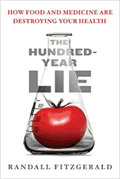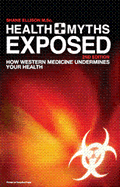Other
Howenstine Articles:
Use of CoQ10
to Treat Malignancies
Why You Should Avoid Taking Vaccines
ASCORBIC ACID COMPETES WITH SUGAR IN THE IMMUNE SYSTEM
By Dr. James
Howenstine, MD.
December 25, 2006
NewsWithViews.com
Nearly every animal converts sugar into ascorbic acid (Vitamin C). Human beings, primates and guinea pigs are the only organisms unable to do this. The enzyme L-gulonolactone oxidase that accomplishes this chemical reaction does not work in these beings. This forces these beings to obtain ascorbic acid from food or supplements. Research studies suggest that humans would produce about 2 to 4 grams of Vitamin C daily under normal conditions and about 15 grams daily[1] when under stress.
Insulin moves both glucose and ascorbic acid into cells including phagocytic immune cells. The phagocytic cells like leukocytes attack and remove microbes, tumor cells and debris from the blood. The level of ascorbic acid in leukocytes may be 80 times greater than that found in plasma. Glucose and ascorbic acid are constantly competing for insulin transport so diets high in sugar and carbohydrates will decrease the amount of ascorbic acid that enters cells and thus create undesirable effects on the immune response.
There is another form of competition between glucose and ascorbic acid. Ascorbic acid stimulates the hexose monophosphate (HMP) shunt and glucose inhibits it. The HMP is a series of chemical reactions that reduces niacin coenzyme NADP to NADPH. Phagocytes need NADPH to create superoxide and other reactive oxygen species that are used to destroy pathogens. In addition to creating NADPH ascorbic acid has the ability to deactivate excess quantities of NADPH and oxidative substances that could harm normal tissues.
The hexose monophosphate shunt also produces 5 carbon sugars (ribose and deoxyribose). These 5 carbon sugars are needed to make DNA and RNA. When the immune system faces microbial invasion it immediately signals for production of new immune cells that need these genetic materials DNA and RNA. If the body has too much glucose and too little ascorbic acid there will be a lack of genetic material and inadequate DNA and RNA for creation of needed new leukocytes. Clearly high sugar intake will reduce the potential health benefits of this pathway.
The failure to evaluate glucose intake may afford a good explanation for failure of some earlier research studies about ascorbic acid to show beneficial effects. Persons taking Vitamin C with sugary fruit drinks and pastries will fail to show any benefit from Vitamin C therapy.
The addictive property of sugar makes it routine for food manufacturers to place sugar in nearly all packaged and processed foods. Sugar intake in U.S. citizens has gone from a few pounds a year in 1800 to about 155 pounds per person currently. The excess intake of sugar plays a major role in the current diabetic epidemic, obesity, arteriosclerosis and rising cancer incidence.
A Swedish urologist, Dr. Jan Hammarsten, is an expert in the relationship between insulin and prostate cancer.[2] He relates that there is no evidence that insulin causes prostate cancer. What insulin does do is act as a stimulus for prostate and probably other cancers to grow and become more aggressive. Between the years 1995 and 2003 Dr. Hammarston’s group studied 320 patients with biopsy proven prostate cancer. They also used ultrasound to measure the size of the prostate gland. They did blood tests for all the components of metabolic syndrome (insulin, cholesterol, triglycerides and uric acid).
Excess insulin caused the cancers to grow more rapidly. The men who died had a faster rate of growth of prostate tissue and also had more aggressive scores on the cancer biopsy samples. Elevated fasting blood insulin levels were associated with the lethal cases of prostate cancer. The higher the insulin levels the greater the likelihood of death. The insulin values were more accurate than microscopic grading of stage of the tumor or PSA values in identifying persons at risk of rapid fatal cancer courses. This suggests that revising diets in cancer patients toward low insulin stimulating foods may be as worthwhile as what therapeutic agents are being administered.
Excessive sugar intake is now regarded as the number one risk factor for females[3] and the number two risk factor for males in the causation of heart attacks. Obviously public health efforts to decrease arteriosclerotic heart disease should focus on this problem. However, the truth about sugar could hurt food conglomerate profits so it is not discussed. Pyridoxine B6 100 mg daily significantly decreases the incidence of heart attacks probably by the mechanism of it’s infection[4] fighting capability. Decrease in gingivitis and bacterial infection in artery walls can curb the incidence of arteriosclerosis.
There is evidence that the Vitamin Pyridoxin B6 appears to block the adverse effects of excessive intake of glucose in patients with arteriosclerosis as use of this vitamin decreased death from heart attacks in population[5] studies involving women.
Supplemental Vitamin B6 also increases the possibility of avoiding cancer.[6] Therefore all persons may benefit from taking 100 mg of B6 Pyridoxine daily.
What happens to patients who lower their insulin values? Dr. Dean Ornish uses a plant based diet. The cancer markers for the men on this diet decreased[7] over a one year followup whereas the control patients on a standard diet saw their tumor markers get worse. This suggests that individuals on a low fat low carbohydrate diet will do well in avoiding and defeating cancer by keeping their insulin values low. This diet is exactly the same as the diet used in the initial stage of therapy for Type 2 diabetes.[8]
Dr. Robert Rowen advises getting an 8 hour fasting insulin test annually which is a good idea because it identifies persons at risk of becoming diabetics when elevated values are discovered. This test may be even more important for patients with malignancies because elevated insulin results select out the cancer patients at risk of early death because of rapid uncontrolled spread of cancer. Persons with or concerned about cancer will probably fare better if they go on a low fat, low carbohydrate diet. The fasting insulin value needs to be below 5 mU/L.[9] The nearer this value is to zero the better. On a vegetarian low fat low carbohydrate diet Dr. Rowen has been able to reduce his fasting insulin blood level to zero. Decreasing fat intake in the diet permits smaller quantities of insulin to control blood sugar values than when fat intake is uncontrolled. When there is no carbohydrate excess in the diet and the carbohydrates being eaten are low glycemic (do not cause prompt large increases in insulin output) the pancreas produces less or no insulin. High glycemic carbohydrates include potatoes, corn, rice, bananas and pasta.
To the best of my knowledge no other cancers have yet been studied to see if this relationship between high carbohydrate diet with corresponding high insulin levels causes increasing cancer deaths holds up for other cancers as well. My guess is this is likely to turn out to be just as dangerous for these cancers as it is for prostate cancer.
|
Subscribe to the NewsWithViews Daily News Alerts! |
The fasting insulin blood test is probably the most important blood test that is rarely utilized by U.S. health care providers. Insist on obtaining this test at least once a year. Early discovery of high insulin values enables the pre Type 2 diabetic to institute restriction of sugar and fat which will reverse the impending diabetic state in 90 % of persons. This will permit these individuals to avoid the ravages of long term hyperinsulinemia (premature aging and death).
Footnotes:
1,
Ottoboni F. Ottoboni A. Ascorbic acid and the immune system. The
Journal of Orthomolecular Medicine 2005;20(3):179-183
2,
Hyperinsulinemia: a prospective Risk Factor for Lethal Clinical
Prostate Cancer Eur J. Cancer, 2005 Dec; 41(18):2887-95 EPub
2005,October 20.44412 (5/2006);
3,
Grant WB Reassessing the role of sugar in the etiology of heart
disease. J Orthomolecular Med 1998;13(2): 95-104
4,
LS et al Vitamin B6 and immune competence Nutrition Reviews 1993;51,
8:217-25
5,
Rimm EB et al Folate and vitamin B6 from diet and supplements in
relation to the risk of coronary heart disease among women Journal
American Medical Assoc 1998; 279:5:359-364
6,
Maksymowych AB et all Efficacy of Pyridoxal treatment in controlling
the growth of melanomas in cell cultures and an animal pilot study.
Anticancer Research 1993; 13: 1925-1938
7,
Ornish, Dean et al J. Urol.. 2005; 174(3) 1065-9
8,
Howenstine, James A. A Physicians Guide To Natural Health Products That
Work 2002 pg. 100-04 Penhurst Books Miami, Fl.
9,
Rowen, Robert M.D. Second Opinion Vol
XVI No. 11 November pg 1-3.
© 2006 Dr. James Howenstine - All Rights Reserved
Sign Up For Free E-Mail Alerts
E-Mails are used strictly for NWVs alerts, not for sale
Dr. James A. Howenstine is a board certified specialist in internal medicine who cared for office and hospital patients for 34 years. Four years of research into natural health convinced him that natural products are safer, more effective and generally less expensive than pharmaceutical drugs. This research culminated in writing the book A Physician’s Guide To Natural Health Products That Work (328 pages) $17.95.
This book and recommended products can be obtained from www.naturalheathteam.com and by phoning 1-800-416-2806. Dr. Howenstine can be reached at dr.jimhow@gmail.com and by writing Dr. James Howenstine C/O Remarsa USA SB 37, P.O. Box 25292, Miami, Fl. 33102-5292.
E-Mail:
dr.jimhow@gmail.com
Glucose and ascorbic acid are constantly competing for insulin transport so diets high in sugar and carbohydrates will decrease the amount of ascorbic acid that enters cells and thus create undesirable effects on the immune response.













